Summer RV Maintenance Guide: 7 Tips Dealers Should Share With Customers
Help customers avoid costly repairs and trip delays with these summer-ready RV service tips, safety checks and seasonal advice.
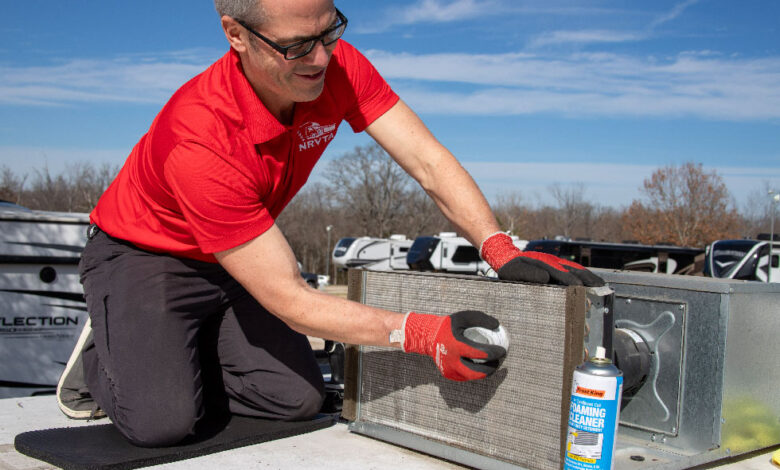
Summer is the most anticipated time of year for RV travel. Whether it’s weekends at favorite campgrounds or cross-country family adventures, RVs see their heaviest use when the days are long and the weather is warm.
However, summer’s heat, storms and longer driving distances also push RV systems to their limits. Without proper preparation, small oversights can quickly grow into costly repairs — or worse, ruin an entire trip.
A little preventative maintenance goes a long way. Set up your customers for success by educating them about what it takes to get an RV summer-ready — and what your dealership can do for them ahead of time. The following comprehensive guide provides key maintenance steps, real-world examples of what can go wrong and practical tips for owners heading into the busy season.
1. Keep Cool: Air Conditioner & Ventilation System Care
In peak summer heat, a properly working air conditioner isn’t just about comfort — it’s critical for safety, especially for pets, kids and older travelers. Preparation steps include:
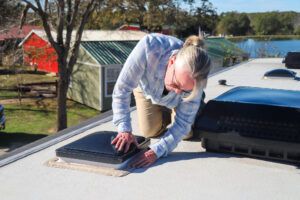 Cleaning or replacing air filters: Dust, pollen and debris restrict airflow. Filters should be checked monthly during summer use.
Cleaning or replacing air filters: Dust, pollen and debris restrict airflow. Filters should be checked monthly during summer use.- Inspecting evaporator and condenser coils: Dirty coils reduce cooling capacity and can cause system strain. Gently clean coils with a soft brush or compressed air.
- Checking ductwork and airflow: Remove vent covers and ensure no blockages exist.
- Testing the thermostat: Confirm it cycles correctly and maintains set temperatures.
If neglected: Neglected systems can overheat, leading to compressor failure — a costly and often trip-ending repair. For example, an RV that loses AC cooling while parked at a desert campground can become dangerously hot in less than an hour, putting occupants at risk of heat-related illness.
Pro Tip: Consider shading the roof-mounted AC unit or installing vent covers to improve airflow and reduce cooling load.
2. Tires: Safety Starts Where the Rubber Meets the Road
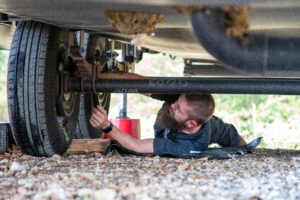 Tires endure the harshest treatment during summer travel. High ambient temperatures combined with heavy RV loads create the perfect conditions for blowouts. Important tire checks include:
Tires endure the harshest treatment during summer travel. High ambient temperatures combined with heavy RV loads create the perfect conditions for blowouts. Important tire checks include:
- Inspecting tread depth: Ensure it meets minimum safe levels — usually 4/32 inches for steer tires and 2/32 inches for trailer tires.
- Checking sidewalls: Look for cracks, cuts, bulges or dry rot symptoms, especially on RVs stored outdoors.
- Confirming proper inflation: Check when tires are cold. Refer to the manufacturer’s placard or RV owner’s manual for correct PSI.
- Reviewing tire age: Most RV tires have a usable lifespan of five to seven years, regardless of mileage.
If neglected: Tire blowouts are the leading cause of RV highway emergencies in the summer. Beyond the inconvenience, a blowout can damage RV undercarriage components, cause loss of control and, in extreme cases, result in severe accidents.
Pro Tip: Carry a portable air compressor and tire repair kit. Investing in a tire pressure monitoring system (TPMS) provides real-time data and early warnings of trouble.
3. Batteries: Power When You Need It Most
Summer trips heavily tax RV batteries, especially when boondocking, running air conditioners and using onboard entertainment. Proper battery care includes:
- Testing voltage levels: A fully charged 12-volt battery should measure around 12.7 volts resting. Anything below 12 volts indicates a discharged battery.
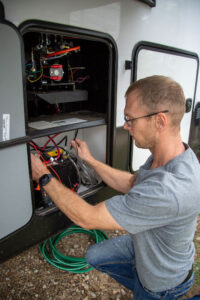 Cleaning and securing terminals: Remove corrosion with baking soda and water; coat terminals with dielectric grease.
Cleaning and securing terminals: Remove corrosion with baking soda and water; coat terminals with dielectric grease.- Checking water levels: For flooded batteries, ensure plates are submerged in distilled water.
- Load testing: A load tester can assess the battery’s ability to sustain voltage under demand.
If neglected: A weak battery can fail without warning, leading to inoperable appliances, lights and emergency systems. One common issue: RVers returning from a hike to find their fridge warm and batteries completely drained due to unnoticed parasitic loads.
Pro Tip: Solar trickle chargers are an easy way to maintain battery health during storage and help keep batteries topped off when dry camping.
4. LP Gas System: Check for Safety & Efficiency
LP gas systems fuel essential appliances such as stoves, ovens, refrigerators, furnaces and water heaters. Proper maintenance includes:
- Performing a leak check: Using a manometer or soapy water at all connections.
- Inspecting hoses, regulators and tanks: Look for cracks, brittleness or signs of aging.
- Testing all propane-powered appliances: Verify ignition, consistent flame size and proper cycling.
If neglected: Leaks can lead to dangerous fires or explosions. In less severe cases, failed regulators or leaking hoses can lead to loss of refrigeration, food spoilage and interrupted trips.
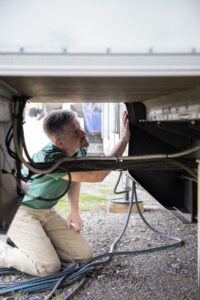 Pro Tip: Always travel with extra propane regulator washers and replacement hoses.
Pro Tip: Always travel with extra propane regulator washers and replacement hoses.
5. Plumbing System: Flow Freely All Summer Long
Summer travel increases water demand, especially with more showers, cooking and outdoor activities. Key plumbing maintenance tasks include:
- Checking for leaks: Run water through each faucet, shower and outdoor sprayer; check under sinks and cabinets for drips.
- Inspecting the water pump: Listen for abnormal cycling sounds and confirm steady pressure.
- Sanitizing the fresh water system: Use a diluted bleach solution to clean tanks and lines.
- Testing the water heater: Confirm it lights easily and produces hot water without sputtering.
If neglected: Leaks can cause hidden damage to subflooring and insulation. A malfunctioning water pump or clogged water heater can leave travelers without essential water supplies in remote areas.
Pro Tip: Install a water pressure regulator at campground hookups to prevent bursts in older or fragile RV plumbing systems.
6. Seals, Roofs & Slideouts: Defend Against the Elements
Summer storms and UV exposure can wreak havoc on RV exteriors. Important maintenance includes:
- Inspecting the roof: Look for cracked sealant around seams, antennas and vents.
- Checking all exterior seals: Windows, doors, slideouts, storage bays — seal any visible gaps with compatible RV caulking.
- Lubricating slideout rails and seals: Prevent rust, sticking and tearing.
If neglected: A single missing seal around a skylight or vent can lead to thousands of dollars in hidden water damage over the course of a season. Slideouts that are not lubricated can seize up halfway extended, forcing costly roadside repairs.
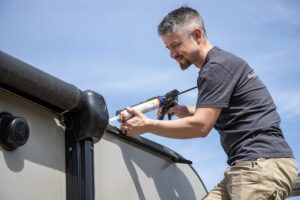 Pro Tip: Schedule a professional roof inspection at least once a year and self-check before every major trip.
Pro Tip: Schedule a professional roof inspection at least once a year and self-check before every major trip.
7. Interior & Exterior: Full Systems Check
Beyond mechanical and safety systems, general maintenance keeps the entire RV experience enjoyable. Summer checks should include:
- Testing appliances: Run all major appliances (fridge, stove, microwave, AC, furnace) under load.
- Checking safety systems: Smoke detectors, carbon monoxide detectors and LP gas alarms should all have fresh batteries and test properly.
- Securing loose interior items: Tighten cabinet hinges, door latches and mounting brackets.
- Washing and waxing the exterior: Protects against sun damage and makes post-trip cleaning easier.
- Cleaning and inspecting awnings: Open fully, wash with RV-friendly cleaner, check for tears and allow to dry before rolling up.
If neglected: Appliances can fail mid-trip, leading to spoiled food, uncomfortable living spaces or even safety hazards. Awning failures — such as tearing loose during a sudden storm — are common issues that can easily be avoided with basic seasonal checks.
Pro Tip: Create a seasonal maintenance binder to track inspections, repairs and service dates for easier future planning.


